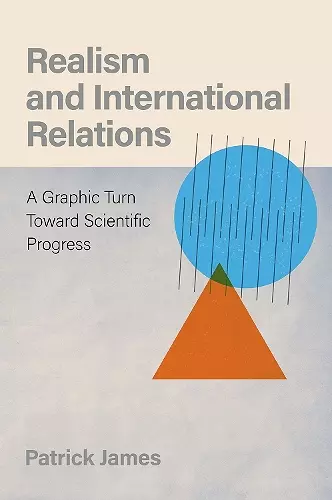Realism and International Relations
A Graphic Turn Toward Scientific Progress
Format:Hardback
Publisher:Oxford University Press Inc
Published:21st Dec '22
Should be back in stock very soon

Realism is one of the core theories within the field of international relations, and it generally posits a state system characterized by anarchy where states act in what they perceive to be their own self interests. It is a controversial theory, and it has many opponents. Yet effective debate among realists and those who identify with other schools of thought has diminished dramatically over time. As Patrick James argues in Realism and International Relations, scholars in the field have become dissatisfied with results from exchanges in words alone. He contends that translation of the vast amount of information in the field into knowledge requires a greater emphasis on communication beyond the use of text. Given the challenges posed by existing and intensifying information overload, he develops a new model that relies on the graphic representation of analytical arguments. As James explains, realist scholarship in the post-World War II era is the natural domain for the application of systemism, a graphic form of expression with straightforward rules for portrayal of analytical arguments, notably cause and effect within theories. Systemism goes beyond prior iterations of systems theory to offer a visualization technique borrowed and adapted from the philosophy of science. Systemist graphics reveal the shortcomings, contributions and potential of realism. These visualizations, which focus on realist theories about war, are intended to bring order out of what critics tend to describe, with some justification, as chaos. In sum, a graphic turn for realism in particular and international relations in general is essential in order to achieve the scientific progress that otherwise is likely to remain elusive. A major theoretical work by an eminent scholar, this will be of interest to all theorists focusing how the international system of states actually functions.
Rejecting the notion that there is no progress in realist theory, this study charts a path via the essential distinction between whether war causes systemic structural change or unexpected structural change causes war, and why. Using a new framework and style of presentation, this treatment examines individual theories and accompanying empirical test. Audacious and thought-stimulating, the discussion stirs debate. The book is a must-read for every student and scholar today. * Charles F. Doran, Andrew W. Mellon Professor of International Relations, School of Advanced International Studies, Johns Hopkins University *
This book is a systematic assessment of the various realist theories. It clearly explicates each theory and assesses it merits. His use of a "graphic" turn is a major innovation that will help theory appraisal. He has set the terms of the debate both for critics and adherents of realist approaches, and for this reason his book is the main one to read--an invaluable contribution for scholars and students. * John A. Vasquez, Mackie Scholar in International Relations, University of Illinois at Urbana-Champaign Urbana *
This is one of the most stimulating books I have read in a good while. Patrick James makes several significant contributions at once. He boldly proposes scientific realism as the philosophical foundation for research in the realist tradition. He develops a graphical vocabulary to systematically elucidate and compare contributions in our field. And he demonstrates the utility of that vocabulary by mapping a great variety of realist research. Beyond what is accomplished in this impressive volume itself, the graphic exposition proposed here has the potential to revolutionize our field, by revealing leaps, loops, and oddities in our arguments and by allowing us to disagree more systematically and more productively. This book should be very widely read and discussed, leading us inter alia to reflect on the nature of causation in international politics. * Annette Freyberg-Inan, University of Amsterdam *
Patrick James's massive, systematic, philosophically sophisticated reconsideration of Realism in International Relations more than vindicates the turn to visual representation, in which he is a leading figure. Were this not enough, James situates Realism in a framework establishing conditions for the development of a proper science of international relations. I may not be persuaded, but I am impressed with the skill, range, and sheer élan that James puts on display. * Nicholas Onuf, Florida International University *
Patrick James presents a powerful case that scientific progress in the field of IR is possible and that realism has a place within it. James develops a metatheory of scientific progress in IR and shows how graphical representations of the vast compendium of realist theories on the causes of war can enhance the prospects for dialogue both within realism and across the different schools of IR theories. Realism and International Relations is essential reading for IR theorists. * Jeffrey W. Taliaferro, Professor of Political Science, Tufts University *
This is an important book. Not only does James synthesize much of contemporary IR theory, he pushes the field forward by offering both conceptual and pragmatic guidelines to evaluate progress within the discipline. Students and scholars will find the call for theory visualization particularly insightful and compelling. A must read! * Joshua Shifrinson, School of Public Policy, University of Maryland *
Realism and International Relations stands as an incredibly ambitious attempt to re-connect realism to metatheoretical debates within the discipline, revive neglected arguments, compare a huge range of theories and advance theoretical integration. * Nicholas Lees, University of Liverpool, Cambridge Review of International Affairs *
ISBN: 9780197645024
Dimensions: 163mm x 239mm x 47mm
Weight: 1093g
648 pages